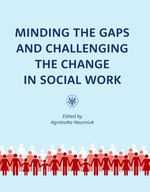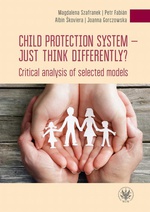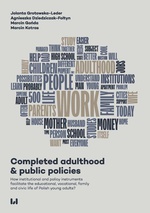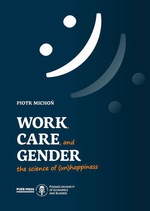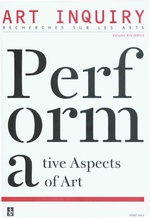System ochrony dzieci – po prostu pomyśl inaczej? Analiza krytyczna wybranych modeli Niniejsza publikacja zawiera kompleksową analizę struktury i historycznego rozwoju czterech prawnych systemów wsparcia rodziny i ochrony dzieci: czeskiego, słowackiego, polskiego i brytyjskiego (Anglia i Walia). Zwraca uwagę na to, w jaki sposób każdy z modeli rozumie dobro dziecka, zwłaszcza w kontekście jego ochrony, a także omawia pozycję rodziców w tym zakresie. Publikacja na licencji Creative Commons Uznanie autorstwa 3.0 PL (CC BY 3.0 PL) (pełna treść wzorca dostępna pod adresem: http://creativecommons.org/licenses/by/3.0/pl/legalcode). Zakres recenzowanej publikacji jest szeroki i bardzo wzbogaca ofertę monograficzną dotyczącą poruszanej tematyki. Niewiele jest prac, które podejmują wątki analizy poszczególnych krajowych systemów po to, by szukać idealnego modelu – rozwiązania instytucjonalnego służącego doskonaleniu rozwiązań z zakresu ochrony praw dziecka. (Z recenzji dr hab. Marty Daneckiej) W odniesieniu do interdyscyplinarnej refleksji nad szeroko rozumianą pracą socjalną nakierowaną na rozwiązywanie problemów dzieci, młodzieży i rodzin dysfunkcyjnych Child protection system… jest moim zdaniem na polskim rynku opracowaniem oryginalnym. Jego olbrzymią zaletą jest teoretyczno-badawczopraktyczna, a także prawna perspektywa zastosowana przez Autorów. Książka może zaistnieć w organizacjach międzynarodowych (takich jak np. Eurochild) oraz toczących się obecnie debatach dotyczących child protection i child care. (Z recenzji dr hab. Agnieszki Golczyńskiej-Grondas, prof. Uniwersytetu Łódzkiego) ********* This publication provides a useful insight into the structure and historical development of four family support and child protection frameworks: Czech, Slovakian, Polish and British (England and Wales). It looks at how each of the models understands child welfare, especially in the context of child protection and discusses the parents’ position therein. The book could inspire practitioners, researchers and policy makers to redefine child-focused practice and build systems where child welfare is considered paramount and is safeguarded throughout – first and foremost, well- -coordinated and targeted support of their families and, if that is not possible, thoroughly assessed and supported permanent out-of-family placements. The publication is licensed under the Creative Commons Attribution-Share Alike 3.0 Poland license (CC BY 3.0 PL) (full license available at: http://creativecommons.org/licenses/by/3.0/pl/legalcode). The Chapter describing child protection proceedings in the Family Courts in England and Wales is essential reading for those wanting to know more about the evolution of the law, public inquiries following cases where protection was found wanting, and current practice, particularly in regard to fostering and adoption. Much light is shed on the elements of assessing risk and permanence planning. It’s suitable for those needing an overview, but also those wishing to explore the subject in depth. I highly recommend it. (Judge Arvil Calder,Immediate Past President of International Association of Youthand Family Judges and Magistrates) With its broad scope, the reviewed publication is an important contribution to the monographs devoted to the subject. There are not many works that focus on the analysis of individual national systems in order to find a perfect model – an institutional solution that could be used to improve the protection of children’s rights in practice. (Excerpt from the review by Marta Danecka, PhD) As regards interdisciplinary reflection on social work understood as providing solutions to problems of children, youths and dysfunctional families, Child Protection System – just think differently? Critical analysis of selected models is, in my opinion, a publication that is unique on the Polish market. Its vast advantages include the theoretical and practical research-based approach as well as the legal perspectives applied by the authors. The book may find its place in international organisations (such as Eurochild) and in on-going debates concerning child protection and child care. (Excerpt from the review by Agnieszka Golczyńska-Grondas, Professor of the University of Łódź) ********* Magdalena Szafranek (ORCID 0000-0002-4675-2385) – is a sociologist and lawyer working at the Institute of Applied Social Sciences at the University of Warsaw. Her research interests include child and family support in the local environment and changes in civil society. She is a member of the Management Board of the Family Judges Association in Poland and of the General Committee of the International Association of Family Judges and Justices of the Peace. She holds the position of editor-in-chief of the scientific journal "Dziecko krzywdzone. Teoria, badania, praktyka" (Child Abused. Theory, Research, Practice), which is published by the Dajemy Dzieciom Siłę Foundation. Petr Fabián (ORCID 0000-0001-5144-9754) – studied philosophy, theology and special pedagogy. He prepared his doctoral thesis on the issue of introducing quality standards into the child protection system in the Czech Republic. He completed psychotherapeutic and supervisory training and led a therapeutic programme in a therapeutic community for children and young people abusing drugs (addictive substances). Fabián worked for 13 years as the director of an infant home, which he transformed into the Crisis Centre for Family and Child. He is a lecturer at the Silesian University in Opava, where he leads research projects concerning vulnerable children and families and social work with families. Another topic of interest to him professionally is social work with the elderly and the use of assistive technologies. At the same time, he works as a psychotherapist for non-governmental non-profit organisations. Currently, he is managing a new project, unique in the Czech Republic, called the Sluchátko therapeutic line, which aims to make systematic therapeutic help available. In some regions, it is used as a tool to support the deinstitutionalisation of psychiatric care. He publishes mainly on topics related to the family (vulnerable families and the needs of functional families), the e-Health system and paediatric patients. His most recent publication, "Možná to jde i jinak" (Maybe There’s a Different Way), published in 2021, presents a multidisciplinary approach to the theory and methods of social work. Albín Škoviera (ORCID 0000-0002-4534-5219) – graduated in special and therapeutic pedagogy at the Faculty of Arts at the Comenius University in Bratislava. He completed psychotherapeutic training focused on psychodynamics. For 18 years, he worked as a therapist and educator in special educational facilities, and from 1989, he was the director of the Children’s Diagnostic Institute in Bratislava for more than 12 years. Joanna Gorczowska – holds a Master’s degree in pedagogy, is a systemic practitioner and Gestalt psychotherapist. She has extensive experience of working in the child protection system in the UK as a social worker and, since 2012, as an independent social worker preparing systemic parenting assessments and special guardianship assessments for the UK family justice courts. She has worked with abused children, families at risk and foster families. She has published articles and presented papers at conferences in Poland highlighting good practices and solutions in the field of child protection. Currently, she also works as a psychotherapist. Her areas of interest include the impact of early childhood negative experiences on child development and functioning in adulthood and therapeutic support for people with traumatic experiences.
Ta pozycja jest dostępna przez Internet. Rozwiń informację, by zobaczyć szczegóły.
Dostęp do treści elektronicznej wymaga posiadania kodu PIN. Po odbiór kodu PIN zapraszamy do biblioteki.

